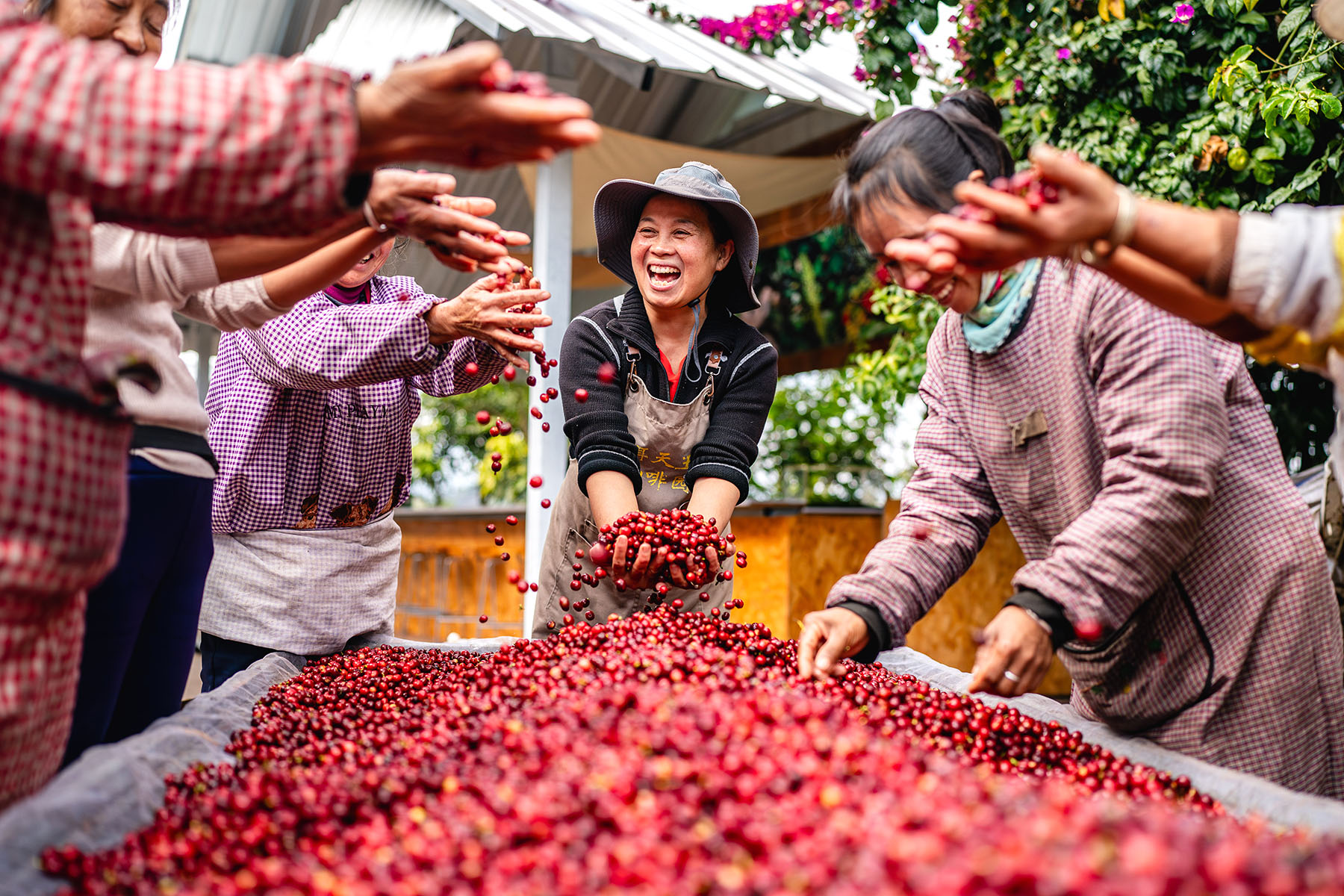Whole region's 2024 output hits 146,000 metric tons, up 13% year-on-year

Fueled by supply shortages and rising prices of coffee beans worldwide, Southwest China's Yunnan province has jumped on opportunities to grow its business globally and expand exports with high-quality locally harvested beans.
Brazil, the world's largest coffee producing country, accounts for 40 percent of the global coffee supply. The Brazilian Instant Coffee Industry Association recently predicted that coffee bean production volume in the South American nation is expected to decline by 4.4 percent this year due to inclement weather, and the trend may continue until 2026. International coffee prices recently hit a record high not seen in nearly half a century in the wake of the trend.
Yunnan, with a coffee planting history of over 130 years, has become a top growing source in China and is known for high-quality coffee beans and large production volumes. By the end of last year, total coffee output in the province reached 146,000 metric tons, valued at nearly 5 billion yuan ($681 million), up 13 percent year-on-year, said the provincial department of agriculture and rural affairs.
READ MORE: Pu'er: Extracting riches from a tiny coffee bean
In the first two months of 2025, Yunnan exported 2,787.5 tons of coffee beans, growing 114.1 percent year-on-year. The export value stood at 140 million yuan, surging 339.3 percent on a yearly basis, said Kunming Customs.
Last year, the province exported 32,500 tons of coffee beans, surging 358 percent year-on-year. The products were mainly exported to 29 countries and regions, including the Netherlands, Germany, the United States and Vietnam, with the export value from Yunnan ranking tops nationwide, it said.
"As of last year, the premium rate of coffee beans in Yunnan reached 31.6 percent, and the deep processing rate reached 80 percent," said Li Xiaobo, chairman of the Coffee Association of Yunnan.
"Yunnan will continue to increase the deep processing rate of coffee beans, strengthen the research and development of products and improve the quality. We will stick to the path of cultivating more premium coffee beans and develop various products in different categories, flavors and packaging to help boost consumption," Li said.
Li added that he was particularly inspired by a recent comment from President Xi Jinping during his visit to the Old Town of Lijiang in Yunnan on March 19, when Xi was invited for a cup of coffee and commented that "Yunnan coffee represents China", and this has given significant encouragement and recognition to local industry players.
As China becomes a major coffee consumer, the nation's coffee sector has witnessed remarkable growth in the past few years, with numerous domestic coffee brands emerging and a more upgraded industry chain being developed.
Baoshan Linguo Coffee Co Ltd, a coffee planter and processor in Baoshan — a renowned coffee-growing region in Yunnan and a hub for premium coffee — said it has provided coffee beans to various customers, including Sam's Club, Walmart's membership-only store chain in China, as the company visited its base in Baoshan two years ago and appreciated the quality of local beans.
"We have been highly focused on quality, and only high quality can help attract more customers. If it's just regular coffee beans, it would be difficult to make a profit, given the cost of planting and processing," said Cao Cunli, president of Linguo Coffee, who has insisted on growing organic coffee beans based on international standards, with the company's output volume not being relatively high.

Cao said that with price increases in the international coffee market and reductions in output volume in countries like Brazil, it has fueled sales of coffee beans cultivated in Yunnan. Yet, the long-term solution of boosting sales still relies on providing high-quality products.
Meanwhile, Pu'er, a city in Yunnan, has been found to be particularly suitable for growing Arabica beans, which feature a less acidic taste, thanks to its ideal climate and fertile soil.
In the 2024-25 production season, the output of green coffee beans in Pu'er is expected to reach 58,000 tons, maintaining a similar level with last year. Based on current market price analysis, the output value is foreseen to become the best year ever since the city began planting coffee beans, according to the projection by the Pu'er tea and coffee industry development center of Yunnan.
Li Jun, deputy director of Simao Customs, a branch of Kunming Customs, said: "We have fully leveraged the role of a national key laboratory for coffee testing in Pu'er, and organized groups of experts to conduct testing on soil, irrigation water, coffee beans and pests at the coffee planting demonstration base in Pu'er."
Aiming to help local coffee bean planters and processors further boost product quality, Kunming Customs has helped local enterprises to tackle problems that they encounter during the planting process, and guide companies to adjust planting density and take regular pests and disease monitoring to improve the stability of quality.
"Based on the test results, more guidance has been provided on the fertilization technology to safeguard the healthy development of the coffee sector in Pu'er and its export business," Li said.
Driven by increasing demand for high-quality beans in the international market, the local government of Pu'er has also been actively guiding planters to strengthen their awareness to cultivate more premium coffee beans and promote the upgrading process.
Now, there are some 270,000 coffee farmers and industry practitioners in Pu'er, and their per capita income has doubled compared to three years ago, the local government said.
ALSO READ: Coffee culture percolating in popularity in Chinese market
Besides coffee planting, Pu'er has developed tourism projects that feature new consumption scenarios. They include coffee estates, coffee-themed commercial complexes, post offices and parks, and the diversified business models of coffee have helped "percolate" to Pu'er's tourism sector.
During the Spring Festival holiday this year, Pu'er received more than 3.25 million tourist visits, up 13.71 percent year-on-year. They spent a total of 3.44 billion yuan, growing 13.21 percent on a yearly basis, the local government said.
China's coffee consumption market has been growing rapidly, and Shanghai owns the largest number of coffee shops in the world. As of the end of 2023, Shanghai had 9,553 coffee shops, according to Business Information of Shanghai, a local market information collector.
Still, there is a significant gap between China's per capita consumption level compared with mature coffee consumption markets such as Japan, South Korea, Europe and the United States, and this certainly creates huge growth potential for China's coffee market, said a report by the World Federation of Chinese Catering Industry.
Contact the writers at zhuwenqian@chinadaily.com.cn


